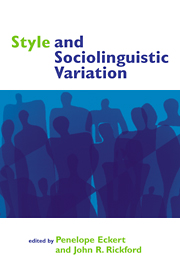Book contents
- Frontmatter
- Contents
- List of figures
- List of tables
- List of contributors
- Acknowledgments
- Introduction: John R. Rickford and Penelope Eckert
- Part I Anthropological approaches
- Part 2 Attention paid to speech
- Part 3 Audience design and self-identification
- Part 4 Functionally motivated situational variation
- 14 Register variation and social dialect variation: the Register Axiom
- 15 Conversation, spoken language, and social identity
- 16 Style and the psycholinguistics of sociolinguistics: the logical problem of language variation
- References
- Index
15 - Conversation, spoken language, and social identity
Published online by Cambridge University Press: 07 December 2009
- Frontmatter
- Contents
- List of figures
- List of tables
- List of contributors
- Acknowledgments
- Introduction: John R. Rickford and Penelope Eckert
- Part I Anthropological approaches
- Part 2 Attention paid to speech
- Part 3 Audience design and self-identification
- Part 4 Functionally motivated situational variation
- 14 Register variation and social dialect variation: the Register Axiom
- 15 Conversation, spoken language, and social identity
- 16 Style and the psycholinguistics of sociolinguistics: the logical problem of language variation
- References
- Index
Summary
Introduction
The general research agenda of Biber and Finegan is to develop a unified theory of style and register which cuts across speech and writing and incorporates work from different subdisciplines, chiefly Hallidayan register studies and quantitative sociolinguistics. In reading Biber and Finegan's (1996) formulation of their position, and indeed in rereading Biber and Finegan (1994), I experienced many disparate kinds of reaction to their work. Consequently, I had difficulty organizing this critique, and the structure of what follows may reflect this. The analysis presented strikes me as so wideranging and diffuse that it is hard to know where to begin. I shall comment in this introductory section first on some general issues, and then move on to more specific points.
Central concepts such as style, register, function, economy, elaboration, clarity, present many conceptual and terminological problems and sometimes seem to suffer from vagueness of definition and fluctuation in their reference even when the authors attempt to define them. This is partly because their analysis covers an immense amount of research territory, different parts of which are occupied by scholars working in different traditions. I therefore begin by querying whether a single model which is as wide as this one attempts to be is desirable or feasible. However, while I find this strategy of building an overarching top-down type of model which incorporates research carried out under different types of agenda quite problematic, some of the assertions which Finegan and Biber present as fundamental principles are reasonable.
- Type
- Chapter
- Information
- Style and Sociolinguistic Variation , pp. 268 - 278Publisher: Cambridge University PressPrint publication year: 2002
- 1
- Cited by



